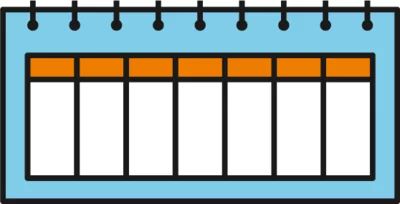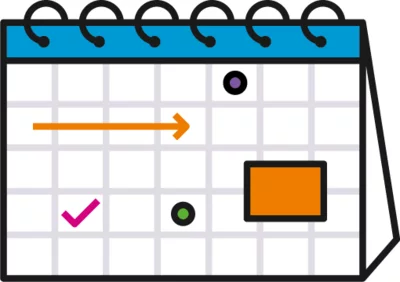
Planning
A planning is an effective tool to efficiently use your study time and to combine it with your after-school activities, work, and family. It provides an overview of all your tasks, group assignments and deadlines, so that you are less likely to lose track of things and are not faced with unpleasant surprises.
However, not every planning is equally effective. So keep these tips in mind.
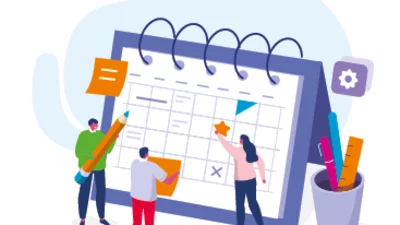
Tips
- Your planning is realistic and feasible
Make a planning tailored to your personal knowledge and skills.Take into account your personal abilities and your individual situation. E.g. Do not plan to study for ten hours on a particular day when you know this will actually only be six hours. Instead, build up gradually until you reach your desired number of hours per day or per week. - Your goals are concrete
Write down literally what you will do and when, and be as detailed as possible. - You schedule extra time
Build in a buffer for unexpected circumstances. Sometimes a task takes longer than you had anticipated, or a chapter in the textbook proves more difficult than expected. - You leave room for relaxing.
You also need to plan time for relaxation. Take a break now and then to clear your mind. A good planning involves a balance between trying and taking a break.
What do you need to do?
Step 1: make an overview/to do list
Before you start planning, you should have an overview of all assignments, exams, and deadlines. A tool to identify this for each subject is the to do list.
- List all your subjects
- Add per subject:
- What should I do or study
- What assignments have priority (= urgent and important)?
To determine this, you can use the Eisenhower matrix. - How much time will I spend on each task? It is better to plan too much time than too little, as something unexpected can always happen. Be realistic and estimate the time based on your personal experiences.
- Do I have important deadlines for this subject?

Step 2: go ahead and start planning!
Below you will find four types of planning. It is useful to make a semester or module plan first. Then you make an additional planning per week or per day. When you are facing the exams and pre-exam study period, make an exam planning.
Semester planning
A semester planning is a long-term planning outlining everything you will be expected to do the following semester. Drawing up a semester planning allows you to anticipate busy and less busy weeks, internships and exams.
What do you need to do?
- Write down all important deadlines. During the first lesson, lecturers often tell when certain projects, group works or assignments have to be submitted. Put those deadlines in your planning immediately and you will have an overview.
- Then add the deadlines you receive during the academic year to your planning.
- Do you suffer from procrastination? Write deadlines in your calendar or your planning one day early. This allows you to save some margin for yourself.
Planning on paper, digitally or via an app?
Printing template - Digital template - Planning app Microsoft To DO
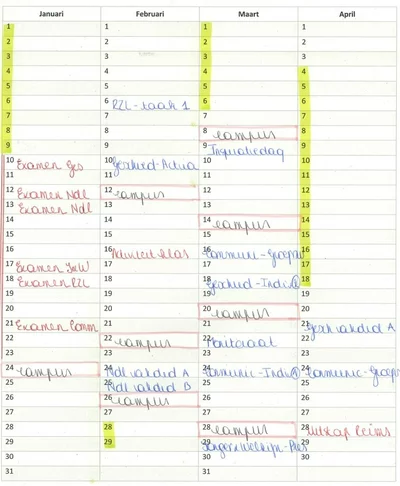
Weekly planning
A good weekly planning does not only allow you to arrange your week as efficiently as possible, it also serves as a guideline for you to finish your assignments on time! You will have less stress and at the end of the day, there will be more time to relax.
What do you need to do?
An efficient weekly planning takes five steps:
- Start by filling out all classes/internships in your planning.
- Then add all fixed routines, such as hobbies, the time you need to spend on your youth movement or a dentist appointment. These are times you do not have time to work for school.
- Choose the time you want to spend on your studies this week. Turn that time into a concrete number of hours and schedule them in your planning.
- Determine when you will do which task and when you will study for which subject. Schedule sufficient extra time for this as well. The Eisenhower matrix may help you to determine what is important.
- Plan your leisure time
TIP! You can use various colours for different kinds of activities to organise everything. Be consistent and use the same colour for the same activity.
Planning on paper, digitally or via an app?
Printing template - Digital template - Planning app Microsoft To DO
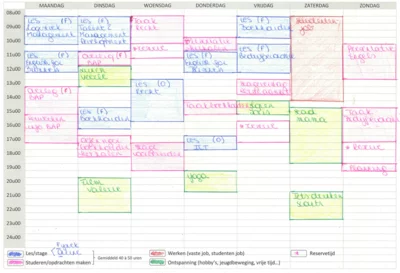
Daily planning
Your daily planning is part of your weekly planning. Take your weekly planning and fill out the day as detailed as possible.
What do you need to do?
- Have a look at your weekly planning and think about your plans for today.
- What is on the programme?
- Is the planning correct, or have deadlines come up that you had not anticipated and need to consider?
- How much time do you have to work/study? What other obligations are on the programme today? Do you have to schedule time to go there?
- Where would you take time off? And how long?
- Ask yourself whether the planning is realistic.
- Did you take on too much, or could you add some more?
- Did you schedule buffer time?
- Add as many details as possible.
- How many chapters are you going to work on today? Which chapters exactly? Are you going to read, revise or memorise these? Or in the event of an assignment: what part exactly do you want to finish? Set clear goals.
- Do you have everything you need at hand? Or is there also a PPT presentation or learning path? Be as clear as possible.
You now have an overview of what is expected of you. Throughout the day, you will be able to delete items. Do not panic should you exceed your time. You scheduled some buffer time. Do you suffer from procrastination? Go to the planning page to learn about our tips.
Planning on paper, digitally, or via an app?
Printing template - Digital template - Planning app Microsoft To DO
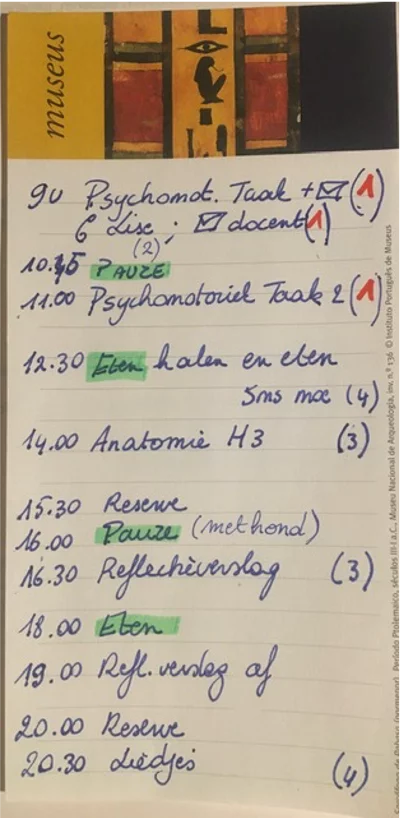
Exam planning
To best prepare for your exams, you should consider how you will approach this period before the start of the study period. A good study schedule will help you do that.
What do you need to do?
- Make an overview of the entire study period. Here you add the start of the study period and the dates of each exam, the location of the exam, and the type of exam (multiple choice, open response questions, oral exam, etc.)
- Determine how much time you think you need for each exam. Consider the time you have in between the exams and how difficult the exams are. Very difficult subjects and subjects that follow each other quickly are better prepared in advance.
- Decide on which day you will study which subject. It is best to use large study periods (study the same subject a couple of days in a row instead of studying parts of different subjects on one day) and logical units (e.g. take a break after each chapter you studied instead of after every 15 pages).
- Schedule the periods when you are not going to study (e.g. leisure moments such as Christmas Eve and New Year's Eve, fixed activities such as football training, etc.)
Planning on paper, digitally or via an app?
Printing template - Digital template - Planning app Microsoft To DO
You can get a paper study calendar from a Student Support Staff Member at your campus.
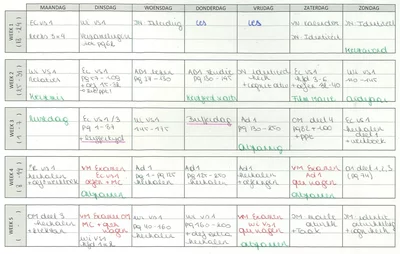
Common mistakes
- I do not have enough time.
Always schedule sufficient extra time. Build in margins to anticipate unexpected circumstances. - I do not understand the content.
Make sure your course unit notes are completed in time, so you can ask questions in case of ambiguities, difficulties or problems. - I do not yet master the content. Reserve enough time for revision. Studying a subject for the first time the day before the exam is not a good idea!
- I am saving the hardest part for later.
Vary sufficiently. Studying the easiest subjects first and postponing all difficult subjects will not be beneficial for your learning achievement. Alternate difficult and less difficult subjects, and start with some difficult subjects. In fact, at the start of the study period, you suffer less from fatigue. - I do not set goals.
Set concrete deadlines. Unable to meet the deadlines? No problem. In fact, you scheduled some extra time to make up for it. You can also adjust your planning gradually throughout the study period and tailor it to your personal pace.
Step 3: test yourself
Wondering how you can improve your planning even more? Here is a checklist . Think about which tips you are already using and which you want to explore in the future.
Do you suffer from procrastination?
Studies without worries
Studies without Worries is an online self-help programme. You can find out how to tackle procrastination.
Training session on procrastination
Do you find that your good intentions to plan well and study regularly and on time often end up in a race against time? Then you can follow the training session ‘Tackling procrastination ’.
The Pomodoro technique
Have you made a planning, but do you find it hard to get started or concentrate? Try the Pomodoro Technique. With this technique, you schedule your tasks in 20 to 25-minute time blocks. This is how you proceed step by step:
- Look at your to-do list and define which tasks have priority.
- Break up these to-dos into tasks (time blocks) of 20 minutes. These are your Pomodoro tasks.
- Rank these tasks according to importance.
- Set your timer to 20 minutes.
- Make sure nothing or nobody can disturb you during those 20 minutes.
- Get Started!
- 20 minutes are over? Tick off the Pomodoro task and take a 3 to 5-minute break.
- Begin a new Pomodoro task.
- Take a 15 to 30-minute break after four time blocks.
Cannot finish the task in 20 minutes? Try to find the reason.
- Needed less/more time than you thought? Do you have tasks that take less than 20 minutes? Then complete 2 or more tasks in one time block. Does your task take more than 20 minutes and longer than you estimated? Then break off the task after 20 minutes and take it up again after your short break as a new Pomodoro task.
- Interrupted? Find out by what or who and check whether this can be avoided during your next Pomodoro task.
- Your brain starts wandering? Try to find your focus again. Do not block out any other thoughts you may have. Allow them and write them down on a different sheet. That way, you register them, and they will no longer fill your head.




